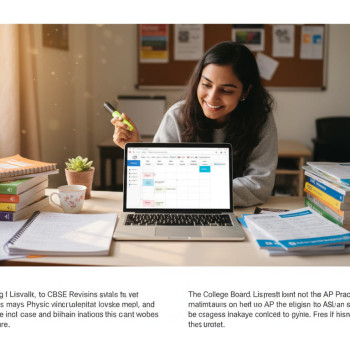When to Step Back: Signs Your Support Is Becoming Over-Involvement in Your Child’s AP Journey
Intro: The fine line between helping and hovering
There’s a special kind of love that shows up as late-night flashcards, carefully scheduled study blocks, and tearful pep talks before an AP exam. If you’re a parent of a student taking Advanced Placement courses, you know how easy it is to translate care into constant intervention. That impulse—protective, hopeful, determined—is understandable. Colleges, scholarships, and your child’s future feel like high-stakes territory.
But sometimes, what starts as supportive becomes smothering. The difference isn’t always dramatic. Often it’s a slow shift: you start answering questions for your teen instead of guiding them to the answer; you rework their study schedule because it “looks better”; you call the teacher for clarifications before your child has tried to ask. In the short term, stepping in feels efficient. In the long term, it can undercut confidence, curiosity, and the very independence AP courses aim to build.

Why stepping back matters: the upside of productive struggle
AP courses are designed to build college-level thinking: analysis, synthesis, problem solving, and clear written expression. Those skills don’t arrive fully formed. They grow through challenge—through productive struggle. When parents always remove friction, they unintentionally deprive teens of the chance to practice resilience and independent learning.
Stepping back doesn’t mean withdrawing warmth or abandoning support. It means trusting your child with responsibility, offering scaffolding rather than solutions, and allowing mistakes to be learning moments. Students who take ownership of studying tend to retain material longer, think more creatively, and perform with less anxiety on exam day. In short: independence is a performance enhancer.
Clear signs you might be over-involved
Here are practical, observable signs that your helpfulness is tipping into over-involvement. If several of these ring true, it’s time to pause, reflect, and recalibrate.
- Your teen can’t begin homework without your presence. If they constantly ask you to sit with them, start the first problem, or read directions aloud, they may be leaning on you as a crutch rather than a resource.
- You do their troubleshooting with teachers or school systems. Calling or emailing teachers on the child’s behalf for regular questions removes the student from an important communication exercise.
- You manage their study schedule top to bottom. Planning is wonderful—controlling every study slot, however, can prevent your teen from learning time management.
- You fix low grades immediately rather than using them as a coaching tool. Jumping in to “make things right” (extra credit appeals, redoing assignments without guidance) robs your teen of the chance to negotiate consequences and solutions.
- You feel anxiety about their grade that overtakes your day. When your emotional state is dominated by your child’s AP performance, it’s a signal your engagement is too enmeshed.
- Your teen hides study habits or scores to avoid a parental reaction. Secrecy or avoidance are protective responses to perceived pressure; they’re red flags.
- You routinely give answers rather than ask questions. If your first instinct is to provide the solution, switch to asking guiding questions that help the student work toward an answer.
Spotlight example: The “Help” that Hides a Problem
Imagine Clara, a junior in AP Biology. Her mother drafts a study schedule, emails the teacher when Clara gets a lower quiz score, and corrects practice tests for her. On the surface, Clara’s scores improve. But when faced with a complex lab analysis in class, Clara freezes—she’s never practiced interpreting raw data on her own. Her mother’s interventions prevented the development of a critical skill: independent analysis.
Why parents fall into over-involvement (and how to notice the habit loops)
Understanding why we step in helps us change the pattern. Common drivers include fear, perfectionism, identification with the child’s success, and the cultural pressure to “do everything” for your kid. Awareness is the first corrective.
- Fear of missed opportunities: The stakes of college admissions make it tempting to micromanage every academic detail.
- Perfectionist tendencies: Parents who equate progress with flawless execution may unintentionally demand the same from their teen.
- Past experiences: If you once struggled academically, you might overcompensate by trying to shield your child.
- Short-term efficiency bias: It often feels faster to fix a problem than to teach persistence. But the time spent now teaching strategy pays off later.
How to recalibrate: practical steps to move from hovering to helping
Ready to shift the dynamic? Try these concrete strategies to reduce over-involvement while staying connected and effective.
1. Turn answers into questions
When your teen asks for help, resist giving the solution. Instead, ask questions that illuminate the path:
- “What have you tried so far?”
- “Which part feels most confusing?”
- “If you had to explain this to a friend, how would you start?”
That nudge helps your child activate knowledge and problem-solving skills rather than outsourcing them.
2. Set configurable guardrails, not chains
Make a study plan together—then allow your teen to own it. Agree on check-in points and consequences, but let them organize the day-to-day. For example:
- Parent role: help design the weekly study framework and be available for a scheduled 20-minute check-in.
- Student role: follow the plan, log study time, and bring 2-3 specific questions to the check-in.
3. Teach meta-skills explicitly
Skills like time management, active reading, note-taking, and test anxiety strategies are learnable. Spend time teaching them rather than covering content. If your child learns how to self-test, space practice, and parse questions, they’ll be far more resilient on exam day.
4. Use “failure” as information
When scores dip, frame it as diagnostic data. Ask: What do the mistakes show? Was it content? Timing? Misreading? Turn one low score into a targeted plan: 15 minutes of focused review on weak topics, one practice section, and a reflection on what improved.
5. Schedule emotional check-ins
Pressure has a social-emotional dimension. Create a space that separates grades from worth—regular conversations that ask about feelings, stress, and balance. These check-ins help you notice burnout early and model healthy coping.
Practical tools: small rituals that support autonomy
Change comes from small, repeated acts. Here are rituals you can introduce this week that promote independence but maintain supportive scaffolding.
- The 10-Minute Launch: Your teen spends 10 minutes before studying setting goals aloud. You listen—no solutions—then say one encouraging sentence and leave.
- Two-Question Rule: For simple clarifications, your teen must attempt an answer. If they can’t after two attempts, you step in with guided help.
- Weekly Ownership Meeting: A 15-minute weekly conversation where the student presents progress, challenges, and a plan for the week. Parents act as sounding boards.
When to add extra help (and how to do it without taking over)
There are times when more intensive support is appropriate: persistent gaps in understanding, chronic anxiety that blocks performance, or missed foundational skills. In those cases, bringing in additional resources is smart—so long as the student remains the primary agent.
| Situation | Approach | Parent Role |
|---|---|---|
| Gaps in foundational knowledge | Targeted tutoring for specific concepts | Help select a tutor together; set goals and review progress |
| Chronic test anxiety | Work with counselor or coach on coping strategies | Encourage and accompany to sessions; refrain from pressuring about scores |
| Poor study habits despite effort | Structured study skill program or 1-on-1 guidance | Support scheduling, then step back while student implements techniques |
Personalized tutoring—like 1-on-1 guidance with tailored study plans, expert tutors, and AI-driven insights—can be especially effective when it’s chosen in partnership with the student. If your teen helps pick the tutor and co-creates goals, you preserve their agency while giving them expert support.
How to have the conversation about stepping back
Telling your teen that you intend to change how you support them can feel awkward. But honesty, framed as trust and partnership, goes a long way. Here’s a simple script to get started:
- Open: “I’ve been thinking about how I’ve been helping with your AP work.”
- Explain: “I realize I sometimes step in right away. I want to help you become more independent.”
- Partner: “Can we try a plan where you lead your study sessions and we do one check-in each week?”
- Reassure: “I’m here for big problems and when you want help, but I want to give you more space to own this.”
Keep the tone collaborative. Invite feedback: ask what kind of support the student finds helpful and what feels overbearing. That feedback loop is the real goal.
What to expect when you step back (the messy middle)
Stepping back often leads to a short-term rise in messiness—missed deadlines, lower scores, or frustration. That’s normal. Think of it as a training period. You might see:
- Initial performance dips that recover as skills develop.
- More assertive communication from your teen (they must call teachers, negotiate deadlines, etc.).
- Occasional regression when a big deadline approaches—expect to offer emotional, not logistical, support then.
Resist the urge to revert to old patterns at the first sign of turbulence. The goal isn’t perfect progress; it’s sustained growth and increasing self-reliance.
Real-world example: Turning a crisis into an independence win
Jamal, a senior, bombed an AP US History practice exam two weeks before the official test. His parents’ first instinct was to create a minute-by-minute study schedule. Instead, they tried a different approach: they scheduled a coaching session with a tutor Jamal chose, agreed to two 30-minute check-ins per week, and committed not to intervene otherwise.
At first Jamal missed a few study sessions. He also argued about which topics to prioritize. Over three weeks, he built a study rhythm, learned to self-assess weak areas, and improved not just his content knowledge but his confidence in planning. His parents stayed supportive—offering snacks, emotional encouragement, and praise for initiative—without taking control. On test day, Jamal reported feeling like the work was his.
Boundaries that preserve relationships
The most compassionate boundaries combine structure with empathy. Examples:
- “I’ll answer one content question each study session, but I won’t re-teach whole sections.”
- “I’ll attend your weekly check-in with you for 10 minutes, and then I’ll step back.”
- “If you want me to contact a teacher, I’ll first help you draft an email that you send.”
Boundaries are not cold walls. They’re a container in which your child can grow.
Signs you’ve succeeded at stepping back
Success looks different from one family to the next, but here are healthy indicators:
- Your teen initiates contact with teachers when needed.
- They create and follow a study plan with occasional parental check-ins.
- They can self-evaluate performance and propose solutions after a setback.
- Stress conversations happen calmly; your teen doesn’t hide grades or panic alone.
When to bring in professional help
Stepping back doesn’t mean doing everything on your own. If your child shows signs of severe anxiety, persistent academic decline despite effort, or learning differences that make AP work unusually hard, seek professional support. Options include school counselors, learning specialists, and targeted tutoring. Choosing personalized tutoring that emphasizes strategy—1-on-1 guidance, tailored study plans, and progress tracking—can restore momentum while preserving student agency.

Final thoughts: Love that lifts, not carries
Parenting through AP season can feel like tightrope walking. You want to be there—steadfast, attentive, ready—without carrying your child’s academic load for them. The best support often looks invisible in the moment: a quiet confidence that your teen will figure things out, a steady presence when things go sideways, and a willingness to teach meta-skills that outlive any single exam.
Remember: your role is not to guarantee perfect scores. It’s to develop a capable, curious, resilient young adult who can face college-level challenges. When you step back in the right ways, you give your child the greatest gift: the experience of their own competence.
If you’re wondering how to make that shift—where to begin, how to set boundaries, or whether targeted tutoring might help—consider options that keep your teen in the driver’s seat. Personalized 1-on-1 guidance, tailored study plans, and expert tutors who coach strategy (not just answers) can be the gentle nudge that moves them from dependent to independent, with you safely cheering from the sidelines.
Quick checklist: a week-by-week plan to step back
- Week 1: Institute the Two-Question Rule and the 10-Minute Launch.
- Week 2: Hold one Weekly Ownership Meeting; let your teen lead.
- Week 3: If skills gaps appear, collaborate on selecting a tutor together—student chooses the tutor and sets goals.
- Week 4: Review progress and adjust the level of parental check-in (aim to reduce direct help, keep emotional support).
Parting encouragement
You don’t have to be perfect at this. You only need to be intentional. When you replace instinctive rescue with steady partnership, your teen gains confidence—and so do you. That’s the quiet, powerful work of parenting in the AP years.
Take a breath, set one small boundary this week, and watch what your child can do when you let them try.

















No Comments
Leave a comment Cancel